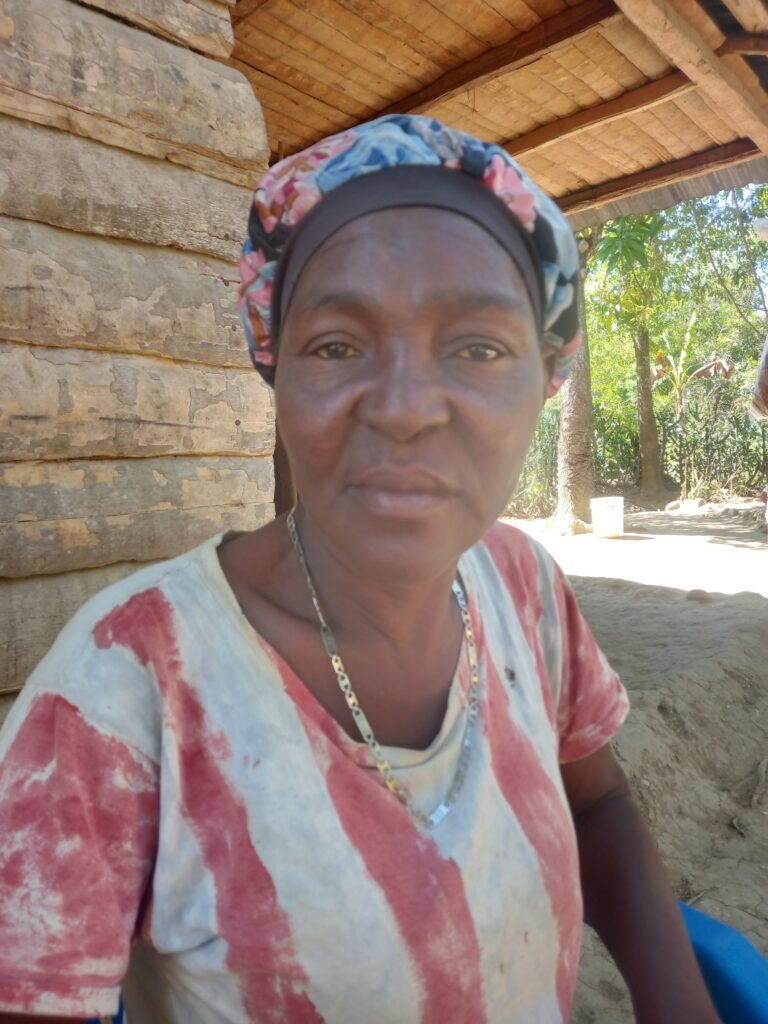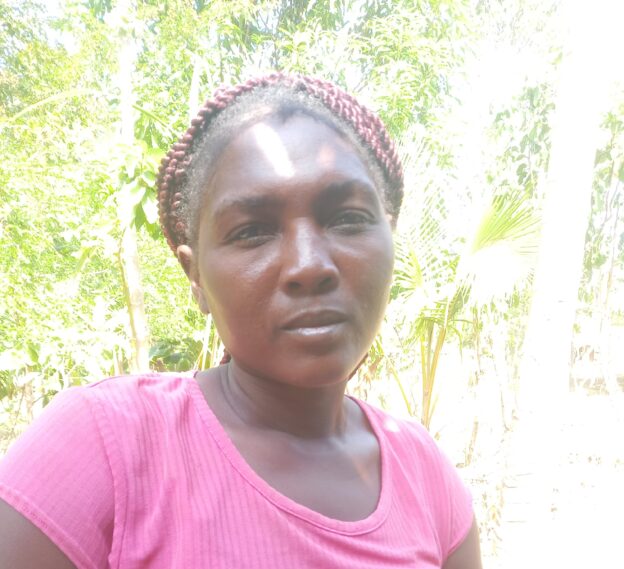Ercilia lives in Wòch Pab, a farming community south of the road that cuts through Pouli. It is just below the mountain that separates Laskawobas from Savanèt. She is in her 40s, but has only been in Wòch Pab for a couple of years. She lives with four of her children, a grandchild, and her partner, Bertrand.
A few years ago, she and Bertrand bought the land they live on from his brother for 75,000 gourds. That’s about $500 now, but would have been more than twice that when they made the purchase. They sold a large pig and a crop of beans to put together a downpayment of 20,000 gourds. Not long after that, they sold another pig and paid another 10,000. So, they still owe 45,000, and her brother-in-law has been asking about the balance. Bertrand plans to leave so he can earn the money for another payment by working in the Dominican Republic. He and Ercilia do not see another option.
The couple farm together, and Ercilia has managed small commerce on and off over the years. They have not always been as poor as they were when they joined the program. “I had the means to live pretty well, but then I got sick, and that took everything.” She was pregnant, and she miscarried. She had to be rushed to the hospital. She and Bertrand sold their one cow to cover the mounting healthcare expenses.
She has ten children. She had the two oldest with her first partner, who passed away. She had five with a second man, but she felt so mistreated by him and his family that she finally decided to leave them. She rented a small room, where she lived with the two oldest kids, and that’s when she met Bertrand. They now have two young children. Bertrand is nice enough to her older children, but he is only truly committed to his own. “He know he owes my children food to eat, but I have to earn money to cover other expenses myself. I have always done commerce. If I can get my hands on 1,000 gourds, I can find a way to make something of it.” The kids are in school, but Ercilia has not yet been able to buy them books.
Ercilia asked the program to buy her goats, and she got two. One miscarried its first litter, but the other is pregnant. She expects it to give birth in March.
But the progress she’s made so far has little to do with goats. It has much more to do with the stipend she’s been receiving each week. She has gotten 500 gourds, or about $3.30. CLM members typically use the stipend to do lots of different things. They buy food for their family. In fact, we used to call the stipend a “food stipend.” Some buy poultry. Sometimes, members put it directly into purchase of merchandise they can sell.
Ercilia has been investing it all in her savings group. A share in the association costs 100 gourds, and the rules allow her to buy up to five shares a week. She is careful to buy the maximum every week. That investment made it possible for her to borrow the money she needed to buy a hardwood tree, which Bertrand turned into charcoal the she has been selling. She is on track to repay her loan, and has begun to see a difference in the money she has available to manage her expenses. Though her stipend has ceased, she is committed to continuing to buy five shares every week
At the end of a one-year cycle, her savings group will pay all its members the money they have invested along with whatever interest the group has earned through the interest on loans and various fees it charges. In all, Ercilia could have almost 30,000 gourds if she keeps buying five shares every week. She would like to use that money to buy a cow. She thinks of a cow as disaster insurance. “If I didn’t have the cow when I was sick, I could have died.”

Angela lives nearby, though she is from Savanèt, on the other side of the mountain, not from Laskawobas. She seems exhausted by life. “I don’t know anything anymore. I have been through too much. I was a big, strong woman, and this is what’s left of me.”
And it is not hard to understand her attitude. She’s had fourteen children, and only six survive. The first nine she had with her husband, who passed away. By the time he died, the couple had lost their home in a fire. Everything went up in flames. Neighbors gave them the few sheets and old clothes that they needed.
She then met a widower, and had five more children with him, but they eventually separated. She lives in a home on land they purchased together. Her five youngest children now live with her, along with five of her six grandchildren and her current partner. Two of her daughters are now also members of the program.
The household gets by principally through farming. The family eats most of what they grow, but Angela will sometimes sell a large bunch of plantains or a couple of yams when they need cash. She and her partner also earn cash through day labor in neighbors’ fields, but she won’t let her children do so. “I don’t want them to experience that misery.”
She asked the CLM program to buy her goats, and she received two. They are healthy and growing. She and her family appear to take good care of them. They haven’t had young yet, but one is pregnant. The program budgets a certain amount of money for each member to use as a business investment. After her case manager bought her goats, Angela had some money left over, and she she decided to buy pig feed. She had a small pig before she entered the program, and has been struggling to keep it fed during the current dry season.
Like Ercilia, Angela was disciplined about investing her stipend in her savings group, but she isn’t sure what she wants to do with it. She already took out one loan, but she turned the money over to one of her children, who lives and and manages by trading near the Dominican border. She is about to miss her first repayment, so she’ll be charged a small penalty, but she is confident that her child will return the money and that she’ll be able to repay it.
She’s frustrated, though, because she can’t take out another loan until she’s repaid the first one, and she would like to start a business selling pig feed. She could make a little money, but also keep her own pig fed.
She has been struggling to learn to write her name. Her parents didn’t send her to school, and her focus has always been on her children’s education, not on her own. But she’s starting to make progress. Her girls are happy to tease her for her efforts, but they are clearly happy to see her progress, too.

